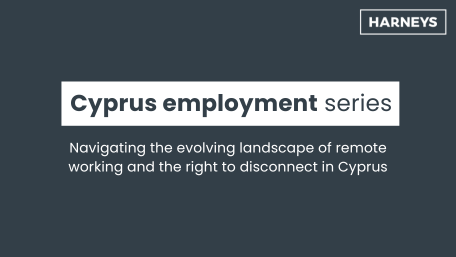Cyprus employment series: Navigating the evolving landscape of remote working and the right to disconnect in Cyprus

While remote working has gained momentum following the outbreak of COVID-19, certain EU countries, such as France, Belgium, Spain, and Italy, acknowledged and regulated certain aspects of the practice, including a universal (ie, not connected only to remote working) right to disconnect, as early as 2006.
Nowadays, all EU member states have remote working-related legislation or collective agreements in place, regulating the practice to varying degrees. However, achieving consensus on an EU-wide directive to harmonise the legal position remains, to this day, elusive.
Case in point, the right of employees to disconnect from the media through which they provide their services, whether remotely or in situ. Notably, 11 Member States introduced and recognised in their laws an employee’s right to disconnect, though the definitions for this and the degrees of application of such a right between Member States vary significantly. Specifically, in six of these Member States, the right to disconnect applies only to remote work involving ICT tools or work carried out at a distance, while for the remaining five, this right applies to all employees. The EU, while strongly in favour of promoting better work-life-balance conditions for all EU citizens, has, to-date, been unsuccessful in establishing a right to disconnect across all its Member States.
Given these discrepancies and the recent stalling of a stakeholders’ dialogue process without tangible results or consensus, the EU Commission is now taking the initiative by kicking off a process expected to lead to the issuance of a directive specific to remote working and the right to disconnect.
Remote working and right to disconnect in Cyprus
In light of the discussions taking place at EU-level, Cyprus, relatively recently (November 2023), took a proactive step in an attempt to regulate remote working and introduce a right to disconnect, and enacted the Organisational Framework on Remote Working Law, L.120(I)/2023 (Remote Working Law).
Cyprus favoured a soft approach over a hard approach, meaning that, under the Remote Working Law, there is no obligation on employers to implement a system that stops work-related communication during non-working hours, taking thereby the decision out of employees' hands. Instead, under Cyprus law, the decision to disconnect during off-hours lies with the employees.
In addition, remote working remains optional and may be agreed between employer and employees. If such is agreed upon, the Remote Working Law ensures that remote working employees are afforded the same rights and protections as those working at the company’s physical premises. The Remote Working Law also mandates that the employer informs their employees of their right to disconnect, without the latter being penalised or faced with any adverse consequences for exercising said right. This right, however, has been connected to remote working and stops short of applying to all employees in relation to their overall work (ie to those working in situ). This is considered by some legal analysts as one of the legislation’s biggest drawbacks and criticisms. Other issues include the absence of a Ministerial decree on remote working costs as well as grey areas on the practical applicability and potential for discharge of statutory duties of care, particularly in relation to health and safety aspects, by an employer.
Be that as it may, employers must ensure that they closely follow the provisions of the Remote Working Law and inform their employees of their rights under the legislation when agreeing to remote working arrangements. This includes the obligation for employers to establish and have a comprehensive remote working policy in place. Such policy should, among other things, outline measures to safeguard employees’ health and safety, protect personal data and confidential information, and provide adequate information regarding equipment use and any associated expenses. Failure to comply with these requirements can result in substantial fines of up to €10,000. Where violations concern health and safety regulations, this could potentially lead to fines of up to €80,000 or imprisonment in the most serious cases.
The regulatory landscape in relation to remote working is rapidly developing and further changes are expected following the finalisation and issuance of the expected EU directive, especially, in cases where the right to disconnect at EU level shall be a universal – as opposed to applicable only to remote working - one. It is, therefore, crucial that employers remain updated with legislative developments in this space and adjust their employment contracts and policies accordingly.
For more information on this subject, please reach out to the authors or your usual Harneys contact.


